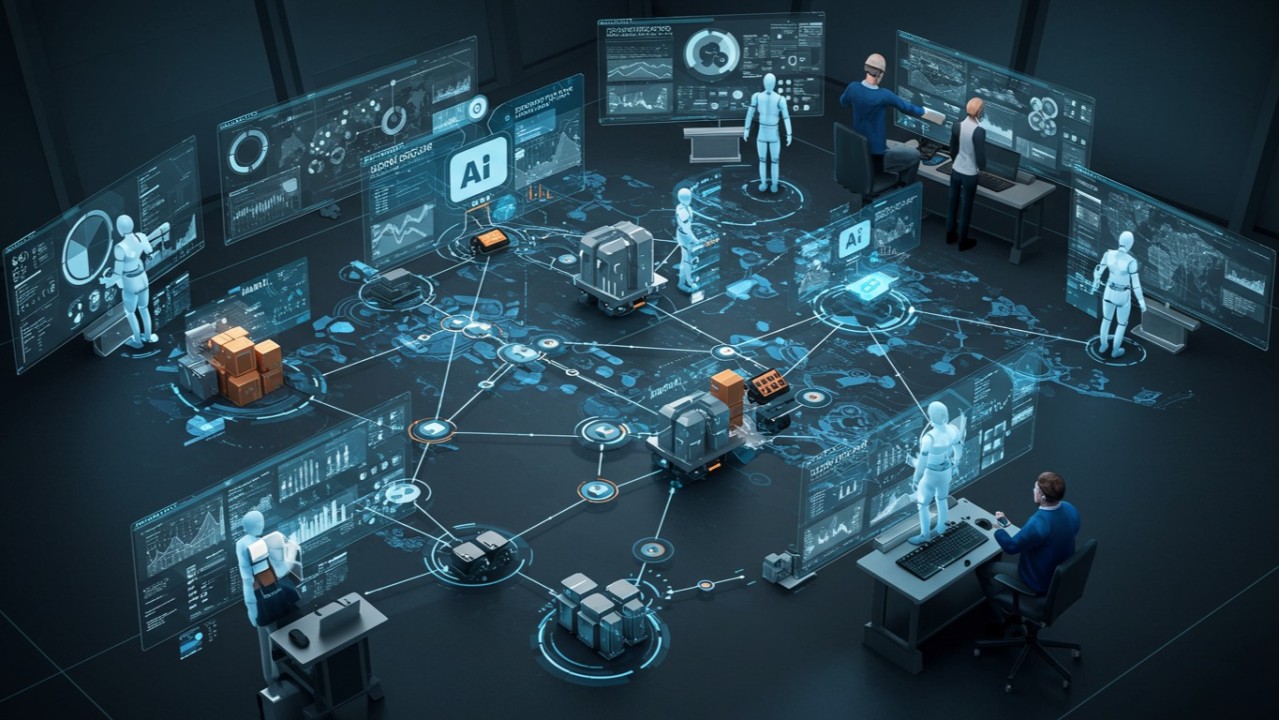In the current world of slow-downs, business organizations depend on strong and efficient supply chain management. Each stage of the supply chain – from raw material sourcing to last-mile delivery – affects cost, time and customer satisfaction. Supply Chain management has typically been a combination of human oversight and ERP systems and rudimentary forecasting models. But the complexity of global trade has grown, along with consumer demands, and disruptions such as pandemics, geopolitical conflict and climate change have made the need for smarter systems more immediate.
This is where the AI Agents for Supply Chain Optimisation step in. These smart systems powered by machine learning (ML), natural language processing (NLP) and decision automation will revolutionize logistics by automating tasks, proactively identifying issues and dynamically taking/re-routing decisions in real-time at scale.
What Are AI Agents?
An AI agent is a self-contained piece of software that can “sense” its environment, process information, and perform actions on its own to reach some objective. Unlike rule-based systems, AI agents can evolve and learn from new information, so they are extremely useful in a changes-in-the-making environment such as supply chains.
In logistics, these agents can:
- Display real-time accounts across warehouses.
- Guess demand vacillations.
- Suggest optimized shipping routes.
- Automate procurement and vendor communication.
- Identify risks by anticipating, rather than reacting with hindsight to disruptions.
They are in effect digital staff who can orchestrate and optimise complex supply chain processes without the need for constant human interference.
Why Supply Chains Need AI Agents
1. Increasing Global Complexity
Worldwide supply chains stretch crosswise many nations, time zones and monitoring systems. Matching them all physically when there are thousands of individuals is time uncontrollable and error-prone.AI agents assist with efficient communication, bottleneck detection and compliance monitoring.
2. Rising Customer Expectations
Shoppers now demand faster delivery, in-store pick ups, and visibility into tracking their orders. AI agents enable real-time visibility and predictive analytics, to assist businesses in meeting these demands.
3. Volatility & Disruptions
And yet, events over the past year — from Covid-19 to shipping container shortages — demonstrate how fragile supply chains can be. AI agents manage exposure by tracking information sources, predicting disruptions and recommending strategy revisions.
4. Cost Efficiency
AI agents save companies millions each year by minimizing stock, avoiding waste and reducing transport costs.
Applications of AI Agents in Supply Chain Optimisation
1. Demand Forecasting
AI-centric machines envisage demand based on ancient sales, seasonality, social media talk and other exterior data (like weather, holidays or economic indicators). Unlike stationary calculating models, they always adapt to new data points as they come in so that account is never not right-sized.
Example: A retail chain’s AI agents forecast impending spikes in demand for winter weather gear, relying on weather reports to know the shelves will be full when called upon.
2. Inventory Management
Capital is trapped in overstock, and unnecessary stockouts result in lost sales. AI agents juggle the books by constantly tracking stock in warehouses, lead times to suppliers and patterns of customer demand.
They can even make reordering automatic, so that products are refilled at the correct time without human intervention.
3. Logistics and Route Optimisation
AI agents take into consideration several factors like fuel costs, traffic movements, port congestion and delivery arrival time to select the most optimal path.
Example: Logistics company can decrease delivery times 15–20% by allowing AI agents to dynamically reroute trucks during peak traffic periods.
4. Supplier Relationship Management
It can be difficult to control the group of suppliers from all around the world. AI agents facilitate communication with vendors, track supplier performance and can even detect possible red flags — late deliveries or lack of compliance.
5. Risk Management & Disruption Prediction
AI agents trawl news feeds, geolocational information and occasionally even satellite imagery — all for hedge funds, private equity firms and government agencies around the world — to predict disruptions from factory shutdowns and strikes to natural disasters. Businesses can then easily adjust production in mid-course or redirect shipments in advance of demand.
6. Sustainability Optimisation
In an era where sustainable practices are heartening the spotlight, AI agents aid companies to minimise their carbon footprints by optimising routes, curbing wastage and proposing more eco-friendly alternatives.
Real-World Case Studies
- Amazon’s Intelligent Logistics
AI agents use Amazon to place inventory in the warehouse. That makes certain that commodities are located closer to the demand center, shortens transport time and lowers transport charges. - Maersk & Predictive Shipping
Maersk uses AI agents to track traffic on global shipping lanes. These agents foresee port congestion and propose alternative routes to circumvent it. - Walmart’s Smart Forecasting
Walmart has stock-forecasting agents, powered by AI, that are trained on sales history and local weather patterns and events to predict what items a specific store will need at any given time.
Benefits of Using AI Agents in Supply Chains
- Cost Reduction: Reduce consumption, fuel feasting and overstocking.
- Speed & Efficiency: Quick routing and inventory: At the time of purchase, users can select from the available options.
- Resilience: First news about the risks means early solutions.
- Customer Satisfaction: Real-time perceptibility, sooner package and fewer stockouts.
- Data-Driven Insights: Turn big data into illegal intuitions.
Challenges & Considerations
While AI agents offer immense benefits, businesses must navigate certain challenges:
- High Implementation Costs
Using AI across supply chains entails significant technology and training investment to get started. - Data Privacy & Security
AI agents rely on vast troves of data — some of which can be sensitive, including customer information, supplier details and shipment data. - Change Management
Transitioning old-school methodologies into the realm of AI can be met with much resistance from within. - Integration with Legacy Systems
Even today, many trades are still functioning on obsolete ERP systems. It can be difficult to ensure that AI agents integrate well.
Future of AI Agents in Supply Chain Optimisation
The future points toward even greater automation and intelligence:
- Autonomous Supply Chains: AI agents driving end-to-end processes with almost no human involvement.
- Collaborative Multi-Agent Systems: AI agents across enterprises working together for efficiency.
- IoT Integration: AI managers working along smart radars and devices for real-time following.
- Blockchain for Transparency: Uniting AI with block cable to create tamper-proof, translucent supply manacles.
Conclusion & Call to Action
AI Agents for Supply Chain Optimisation is a not if, but when discussion. Be the business that is ready to respond to disruptions, better serve your customers and be a leader tomorrow — use AI agents today!
Regardless of whether you’re a global shipping firm or a small- to medium-sized manufacturer, adding AI agents to your supply chain could lead to whole new tiers of efficiency and resilience.
Ali Raza, a passionate blogger with 4 years of experience, shares insights on technology, digital marketing, and fashion at TechBusZone. His expertise helps readers stay updated with trends, tips, and practical guides across these dynamic fields.








